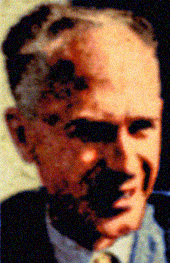Striptease dancer’s schedule assailed
…

By Ernie Pyle
WITH U.S. FORCES IN ALGERIA – It’s a terrific task to organize a shipful of troops. It was not until our England-Africa convoy had been at sea nearly a week that everything got settled down to running completely smoothly.
An Air Forces colonel was appointed Commanding Officer of troops on board. An orderly-room was set up, aides were picked, deck officers appointed, and ship’s regulations mimeographed and distributed.
The troops were warned about smoking or using flashlights on deck at night, and against throwing cigarettes or orange peels overboard. It seems a sub commander can spot a convoy, hours after it has passed, by such floating debris.
The warning didn’t seem to make much impression at first. Soldiers threw stuff overboard, and one night a nurse came on deck with a brilliant flashlight guiding her. An officer near me screamed at her. He yelled so loudly and so viciously that I thought at first he was doing it in fun. He bellowed: “Put out that light, you blankety blank-blank! Haven’t you got any sense at all?”
Then suddenly I realized he meant every word of it, and I realized that one little light might have killed us all.
The ship of course was entirely blacked out. All entrances to the deck were shielded with two sets of heavy black curtains. All ports were painted black and were ordered kept closed, but some people did open them in the daytime.
Sandbags worn at mess
In the holds below, the ports were opened for short periods each day, to air the ship out. The theory of keeping most of them closed in daytime is that if a torpedo hits with the ports open, enough water could rush in to sink her immediately if she listed.
Everybody had a life preserver, and had to carry it constantly. They were of a new type, rather like two small pillows tied together. You put your head between them, pulled them down over your shoulders and chest and tied them there. We merely slung them over our shoulders for carrying. They were immediately nicknamed “sandbags.”
After the second day, we were ordered to wear our web pistol belts, with water canteen attached. Even going to the dining room, you had to take your life preserver and your water canteen.
There were nine in our special little group. We were officially assigned together, and we stuck together throughout the trip. We were:
Bill Lang of TIME and LIFE, Red Mueller of Newsweek, Joe Liebling of The New Yorker, Gault MacGowan of The New York Sun, Ollie Stewart of The Baltimore Afro-American, Sgt. Bob Neville (correspondent for the Army papers Yank and Stars and Stripes), two Army censors (Lts. Henry Mayer and Cortland Gillett) and myself.
Sgt. Neville was probably the most experienced and traveled of all of us – he speaks three languages, was foreign news editor of TIME for three years, has worked for The Herald Tribune and PM, was in Spain for that war, in Poland for that one, in Cairo for the first Wavell push, and in India and China and Australia.
But he turned down a commission and went into the ranks, and consequently he has to sleep on floors, stand for hours in mess lines, and stay off certain decks.
Ollie Stewart is a Negro, the only American Negro correspondent accredited to the European Theater. He is well-educated, conducts himself well, and has traveled quite a bit in foreign countries before.
When humor runs thin
We all grew to like him very much on the trip. He lived in one of the two cabins with us, ate with us, played handball on deck with the officers, everybody was friendly to him, and there was no “problem.”
We correspondents already knew a lot of the officers and men aboard, so we roamed the ship continuously and had many friends. Bill Lang and I shared a cabin with the two lieutenants. We enjoyed ourselves on the trip.
We’d get out the regulations about correspondents, which say that we must be treated with “courtesy and consideration” by the Army. We’d read these rules aloud of Lts. Meyer and Gillett, and then order them to light our cigarettes and shine our shoes. Humor runs pretty thin on a long convoy trip.
U.S. War Department (December 19, 1942)
North Africa.
Our patrols have been active along the whole front.
Formations of U.S. B-17 bombers, escorted by P-38 fighter planes, attacked the docks at Bizerte and Tunis yesterday. Many fires were left burning at both places, Enemy fighters which attacked our bombers were driven off and three of them destroyed.
Light bombers with an escort of P-38 fighters and Spitfires bombed an enemy airfield near Tunis, and others attacked targets near Gabes.
Two enemy bombers were shot down by our fighters over the southern area.
None of our aircraft is missing from these operations.
On the night of December 16-17, one enemy bomber was destroyed, Detailed reports show that in the raids on Tunis and Bizerte on December 15, eight enemy fighters were shot down.
The Pittsburgh Press (December 19, 1942)
Planes blast cities ahead of troops advancing along Bay of Bengal
By Darrell Berrigan, United Press staff writer
…
Work on new plan rushed as larger cities face transport tie-up
…
He prays for food, and an hour later seagull alights on his shoulder; storm supplies drinking water; minds of airmen begin to crack under strain
…